Big Press Conference, Big Pressure Promised to Get Council Decision Before Council Elections
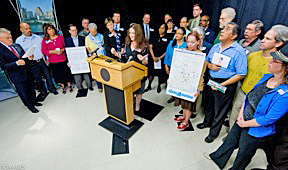
More than two-dozen backers of the proposal to change how council members are elected packed a room at City Hall today for an early morning press conference headed by former State Senator Gonzalo Barrientos (D-Austin).
Barrientos chaired the 2012 Charter Revision Committee appointed by the Austin City Council to recommend changes to the Austin City Charter. The Committee met in locations all over Austin starting last September and finished February 16. The Committee made a total of 19 recommendations for charter changes that the Austin City Council could put on the November ballot.
Most prominent among the 19 recommendations is a call for a proposition that would ask voters to approve a plan calling for 10 geographic council districts to be drawn by an Independent Citizens Redistricting Commission. Under this plan, only the mayor would be elected at-large by all Austin voters.
The Austin City Council could delay until August to decide what propositions to put before voters in the November general election. But the Charter Revision Committee’s majority faction, as well as the grass-roots coalition Austinites for Geographic Representation, are going to apply heavy political pressure for the Council to commit to putting the 10-1 plan and Independent Citizens Redistricting Commission on the ballot in November—and publicly do so before the May 12 mayoral and council elections.
Meanwhile the minority faction of the Charter Revision Committee is still pushing for the City Council to instead put a 10-2-1 plan on the November ballot. That would add two at-large council positions to the 10 geographic council districts.(More about that later.)
Later in the day, Barrientos told The Austin Bulldog that the Charter Revision Committee’s razor-thin 8-7 vote to support the 10-1 plan was irrelevent. A win is a win.
“When I was a 135-pound linebacker playing football in high school, we might win by 25 points or we might win by one or two points.” The margin didn’t matter. “We won—period,” he said, and he’s no less enthusiastic about the Charter Revision Committee’s narrow margin to recommend the 10-1 plan.
Barrientos said the Committee majority and Austinites for Geographic Representation will use every opportunity to encourage the mayor and council members to commit before May 12.
He said these forces will push through every means possible, to include radio and print media, press conferences, telephone calls, letters, citizens communication at council meetings, face-to-face lobbying, candidate questionnaires, and candidate forums where the mayor and council members appear in connection with their re-election campaigns.
Austinites for Geographic Representation has been meeting since February 2011 and since mid-October has been petitioning for the 20,000 signatures needed to put the 10-1 plan and Independent Citizens Redistricting Commission on the ballot.
The group’s volunteer petitioners will be out in force during a South by Southwest concert at Auditorium Shores and the Pan Americana Festival at the Emma Barrientos Mexican American Cultural Center, said Linda Curtis, coordinator for Austinites for Geographic Representation. She has previously led four successful petition drives to get measures on the ballot.
Plans are also in the works for Austinites for Geographic Representation to put on a big musical event of its own in April to draw a thousand people for music, fun, and free admission for those bringing signed petitions, Curtis said.
Broad community support
The crowd behind Barrientos at the press conference represented a wide range of organizations, including NAACP Austin, the League of United Latin American Citizens (LULAC), El Concilio, Travis County Republican Party, Travis County Green Party, Central Texas Republican Assembly, University of Texas at Austin Student Government, Del Valle Community Coalition, and many others.
Representatives attending the press conference from other groups that have not yet endorsed included the League of Women Voters Austin Area and People Organized in Defense of the Earth and her Resources (PODER).
The 10-1 plan also has been endorsed by the Austin Neighborhoods Council and the council-appointed Human Rights Commission.(For a full list of endorsements, click here.) (This link is no longer functional.)
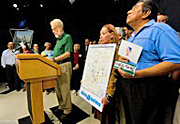
“2012 is emerging as the year in which organizations are coming together to eliminate racism,” Human Rights Commission Chairman Tom Davis said at the press conference. “The Human Rights Commission joins that.”
Charter Revision Committee Member Kathleen Vale referred to an enlarged map displayed at the press conference that was based on The Austin Bulldog’s interactive mapping project published August 4, 2011, to pinpoint the residence location of every person elected mayor or council member from 1971 through 2011. During those four decades, a total of 26 elections were held to fill 17 mayoral positions and 100 city council positions. The result: 15 of 17 mayors lived in west and northwest Austin zip codes 78703 and 78751 when elected, as did 32 of the 100 council members. Large parts of Austin were never represented at all or were grossly underrepresented.
“This map shows that over the last 40 years, 55 percent of elected officials came from just four zip codes representing only 10 percent of the city. The other 90 percent of us got 45 percent of the council seats,” Vale said at the press conference.
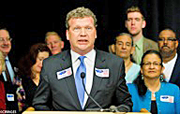
Roger Borgelt, vice president of the Travis County Republican Party, and an early participant in Austinites for Geographic Representation, said the current at-large system of electing council members was established by the 1953 city charter and sustained by the so-called “gentlemen’s agreement” that allows minority representation—but only elects minority candidates approved by the city as a whole, a system he called “paternalistic.”
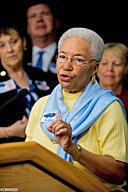
Ora Houston, a long-time eastside activist, urged the council and voters to “trust the process” that resulted in the Charter Revision Committee’s recommendations, which was based on broad public input. “This is a plan from the grass roots up,” Houston said.
Some form of geographic representation has been put on the ballot six times from 1973 to 2002 and failed six times.
But this is the first time that geographic representation has gathered such broad community support for a plan developed by citizens over a long period of time before an election.
Council briefing
Barrientos and others addressed the City Council directly at this morning’s council meeting during a 45-minute briefing on the Charter Revision Committee recommendations.
Barrientos noted the support for the 10-1 plan that had been expressed by legal experts from the NAACP and the Mexican American Legal Defense and Education Fund, as well as David Richards of Richards Rogers & Skeith LLP and Steve Bickerstaff, founder of the Bickerstaff Heath law firm. Bickerstaff drafted the plan for the Independent Citizens Redistricting Commission based on a system used by the State of California.
Barrientos said the need for an Independent Citizens Redistricting Commission is evident given Austin’s experience with gerrymandered legislative districts, and it’s an integral part of the 10-1 plan.

Council Member Bill Spelman engaged in a dialogue with attorney Fred Lewis, a member of the Charter Revision Committee who also has been responsible for much of the legal work connected to the petition drive led byAustinites for Geographic Representation.
When Spelman asked if voters wouldn’t be more likely to vote for the plan if geographic districts were already mapped, Lewis said no. He likened the process to the emotional turmoil that ensues when the school district draws boundaries to determine which children go to which schools, and said it might not be possible to reach agreement on districts before the election.

“The best approach is to set up a fair process with an independent commission to do that in the future, rather than get into the minutiae,” Lewis said.
Asked how the independent redistricting process is perceived in other states that use it, Lewis replied, “It’s well received by the public but not by the people who benefit from gerrymandering.”
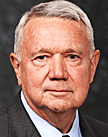
Mayor Lee Leffingwell said none of the states using the independent commissions to draw election district boundaries are subject to the federal Voting Rights Act and therefore don’t have oversight by the Department of Justice that Austin must undergo.
Lewis said the independent commission process is set up to ensure diversity and likely would pass muster with the Department of Justice. (Which is what the legal experts said during the public meetings held by the Charter Revision Committee.)
Former State Representative Ann Kitchen, a member of the Charter Revision Committee minority that voted for a 10-2-1 plan and against the 10-1 plan, addressed the council to deliver the minority report.
“We strongly concur with the need for geographic representation,” she said, “but we also felt like it was important to have at least two at-large council seats.”
Kitchen noted that some in the community want no change from the all at-large system and said “voters are more likely to approve a hybrid system with some familiar elements.”
She said a hybrid system “would allow more than one highly qualified person from the same area to mount a campaign.”
Those communities not geographically concentrated have said they believe they have a better chance for winning a seat in a hybrid system, such as Asian Americans, she said.

Lawyer Richard Jung, a Charter Revision Committee member and vice president of the Korean American Association of Greater Austin, said the hybrid system would “give every group in the city a chance to elect someone.”
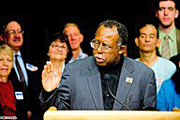
NAACP President Nelson Linder told the council, “Passage of single-member districts is one of the great civil rights issues of this time” and noted that a hybrid system gives some areas more power than others.
Linder said the 10-1 system would be approved by the Department of Justice and the 10-2-1 hybrid system would not, as it would violate the Voting Rights Act.
Linder urged the City Council to make a commitment to put the 10-1 plan on the November ballot and do so before the council elections in May.
“Make sure you don’t pull another Arthur B. DeWitty,” Linder said, referring to the 1953 charter changes enacted after DeWitty, a black man, placed eighth in the 1951 council election, coming within three places of winning the first seat for an African American.
As it turned out, it would be another 20 years before that happened, when Berl Handcox won a council seat in 1971.
DeWitty received 3,636 votes, 24.98 percent, in the 1951 election. In those days, each voter voted for five of the people on the ballot. The top five vote getters became the elected members of the council. The elected council members then chose the mayor.
Block voting by African Americans in the 1951 election resulted in a near-miss for DeWitty. But he came close enough to prompt a charter change, Proposition 5, in January 31, 1953.
That charter change, which passed by a margin of 59-41 percent, resulted in the at-large system for council elections still in force today.
Related stories published by The Austin Bulldog:
Hard Fought, Heartfelt Charter Decision: Charter Revision Committee Votes 8-7 to Back 10-1 Plan for Council Elections, February 3, 2012
New Restrictions Proposed for Lobbyist Fundraising, January 22, 2012
Committee Debates How to Elect Council: Charter Revision Committee Divided Over Pure Districts vs. Hybrid System, January 9, 2012
Thirteen Charter Changes and Counting: Charter Revision Committee’s Next Job: Tackle Plan for Geographic Representation, December 14, 2011
Council Confirms November 2012 Election Date for Charter Amendments, November 3, 2011
Coalition Launching Petition Drive to Get on the Ballot for May 2012 Election, October 18, 2011
Broad Community Interest Focusing on How Mayor and Council Members Elected, October 4, 2011
Coalition Nearing Petition Launch for Grass-roots Council District Plan, August 24, 2011
Maps Prove Select Few Govern Austin: Forty Years of Election History Expose Extent of Disparity, August 4, 2011
Petition Launch Imminent to Force Election for Geographic Representation in City Elections, March 7, 2011
This report was made possible by contributions to The Austin Bulldog, which operates as a 501(c)(3) nonprofit to provide investigative reporting in the public interest. You can help sustain this kind of reporting by making a tax-deductible contribution.







